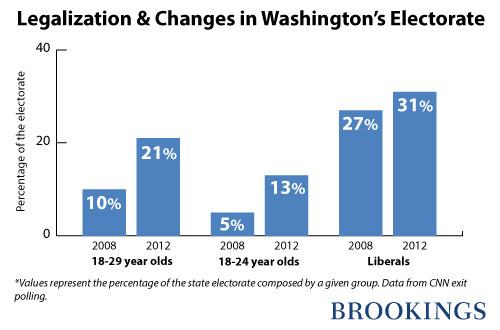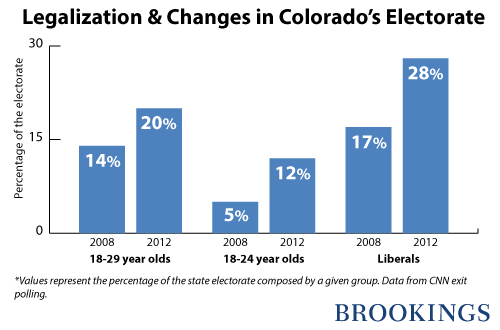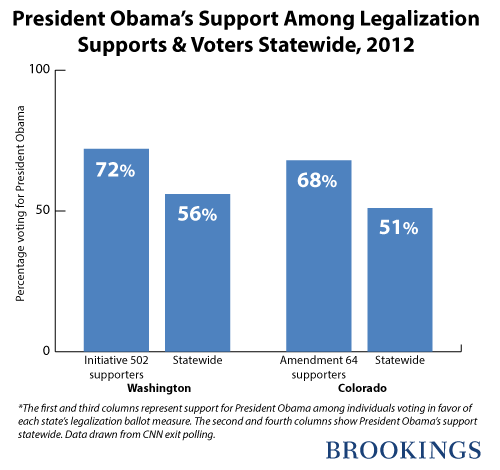Marijuana legalization might ensure Harry Reid remains the Senate Majority Leader in 2014. In a year in which the battle for majority control of the Senate is the biggest story of the midterms, every race counts. One of the more competitive battles for the Senate is taking place in Alaska, where incumbent Sen. Mark Begich is fighting for another six-year term.
However, the Senate race is not the only choice Alaskans will face this November. They will decide whether their state will legalize recreational marijuana, following their counterparts to the south: Washington and Colorado.
There are many reasons why the Alaska Senate race is competitive. Begich eked out a win in 2008 over the late Senator Ted Stevens. Alaska is a conservative, Republican-voting state. Mitt Romney carried the state by 14 points in 2012. In fact, Alaska has only given its electoral votes to a Democratic candidate once since statehood, during LBJ’s 1964 landslide victory. Finally, this year’s Senate race falls during a midterm, when electorates tend to favor Republican candidates, particularly with an unpopular Democrat in the White House.
Marijuana legalization could change that by dramatically changing the character and nature of the midterm electorate in Alaska, and helping Sen. Begich win reelection.
People turn out for elections when they feel passion about a candidate or a race, but ballot initiatives can also generate interest, passion and turnout. Research by Smith, DeSantis & Kassel illustrate that ballot initiatives in 2004 centering on outlawing same sex marriage generated additional turnout (even in a presidential year) among conservatives in key states. Passion about marijuana legalization can do the same, and we have evidence of this effect.
In 2012, Colorado and Washington had statewide referenda on the question of marijuana legalization. With those initiatives on the ballot, the composition of each state’s electorate changed in significant ways. Using exit poll data to compare changes in the characteristics of the electorate in each state between 2008 and 2012, we can make inferences about the effects of legalization initiatives.

Marijuana legalization supporters, particularly passionate ones, tend to be younger and either more liberal or more libertarian in nature—though recent polls suggest broader support in the electorate. In Washington in 2008, the 18-29 demographic composed 10% of the electorate. In 2012, with legalization on the ballot, that number increased to 21% of the electorate—a more than 100% increase. The effect was even more pronounced for the 18-24 demographic, where electoral composition increased from 5% to 13%. In addition, in 2008, 27% of the electorate called themselves “liberal.” In 2012, that number increased to 31%.

Similar trends existed in Colorado. In 2008, the 18-29 demographic composed 14% of the electorate. In 2012, that group composed 20% of voters. In fact, in Colorado the 18-24 demographic increased from 5% to 12% of the electorate from 2008 to 2012. The ideological composition of turnout changed as well. In 2008, 17% of the electorate called itself liberal. In 2012, that figure skyrocketed to 28%.
In Washington and Colorado, the composition of those who turned out to vote changed dramatically between 2008 and 2012—each a presidential year. Nationally, there was little change in the composition of the electorate in terms of youth and liberalism. But in the states with marijuana legalization initiatives it did, dramatically.

There is also evidence those electoral shifts helped Democrats. In Colorado, those who voted in favor of Amendment 64 (marijuana legalization) voted for President Obama at a rate of 68%—far above his support among all Colorado voters (51%).
Similarly, in Washington, among those who voted in favor of Initiative 502 (marijuana legalization), 72% also voted for President Obama. The president won about 56% statewide. Roll Call’s Henry Decker and FireDogLake’s Jon Walker have also offered great insight into how electoral changes coincide with marijuana legalization initiatives.
However, there is more to this story than simply turnout. In many ways, Democrats have missed a real opportunity to make electoral gains—or limit losses—by pushing legalization initiatives. Some credit President Bush’s reelection in 2004 to the push for same sex marriage initiatives on statewide ballots by spurring social conservative turnout. Democrats could have received a similar boost by pushing legalization initiatives that would alter the electorate in a year when Democrats need it for structural and political reasons.
Nevertheless, marijuana legalization efforts are quite different than 2004 same sex marriage initiatives—even beyond the nature of the issues themselves. Same sex marriage initiatives were pushed by the Republican Party in 2004. Efforts in the White House, Congress, and in statehouses drove such initiatives and the political planning around them. On the other hand, the Democratic Party is not spearheading legalization efforts. In fact, there are many factions of the Democratic Party still quite resistant to legalization.
Instead, legalization supporters are the ones pushing legalization initiatives. They compose an odd combination of liberal Democrats, libertarian and conservative Republicans, and apathetic moderates. In many ways, Democratic Party institutions are still not ready or too timid to spearhead legalization movements.
And frankly, legalization supporters would likely resist such party control of the movement—and for good reason. Including legalization initiatives on midterm ballots would almost certainly change the composition of the electorate, but they do not guarantee a win. In fact, the standard composition of midterm electorates—which favors older, wealthier, and more conservative voters—will likely discourage initiatives in many states because of the risk of failure. When a state rejects an initiative, it serves as a blow to the momentum of that movement within the state—something legalization supporters would prefer to avoid.
Alaska and Oregon will vote whether to legalize marijuana this November, and regardless of the outcomes, the presence of those initiatives will likely drive younger and more liberal voters to the polls. However, legalization supporters would be wise to wait until 2016 and capitalize on a dual effect. A presidential election year will bring out voters more sympathetic to legalization, and legalization will bring out even more young, liberal voters than normal.
Marijuana may keep Mark Begich in the Senate and Harry Reid at the helm in 2014, but it may have an even bigger impact on Democratic gains in 2016.
The Brookings Institution is committed to quality, independence, and impact.
We are supported by a diverse array of funders. In line with our values and policies, each Brookings publication represents the sole views of its author(s).



Commentary
Harry Reid Should Love Marijuana: How Legalization Could Keep the Senate Blue
August 20, 2014